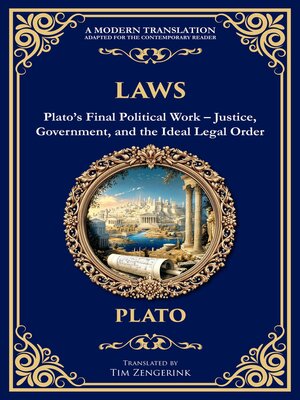Laws
ebook ∣ Plato's Final Political Work: Justice, Government, and the Ideal Legal Order · The Library of Alexandria
By Plato

Sign up to save your library
With an OverDrive account, you can save your favorite libraries for at-a-glance information about availability. Find out more about OverDrive accounts.
Find this title in Libby, the library reading app by OverDrive.



Search for a digital library with this title
Title found at these libraries:
| Library Name | Distance |
|---|---|
| Loading... |
Laws is Plato's final dialogue and most ambitious attempt at political and moral philosophy. Unlike his earlier idealism in The Republic, this work takes a practical and grounded approach to structuring a real-world state, addressing the challenges of implementing virtue and justice among imperfect human beings.
In this deeply contemplative work, three aged men-an unnamed Athenian, a Spartan, and a Cretan-discuss the principles upon which a new colony's laws should be founded. The dialogue blends legal theory with ethical insight, proposing a meticulously organized legal code that balances reason, tradition, and divine inspiration.
What You'll Discover in This Modern Translation:
This modern translation makes one of the most influential political treatises of antiquity accessible for today's reader, drawing timeless insights from a 2,400-year-old conversation.
Whether you are a student of philosophy, law, politics, or ethics, Laws provides essential reading for anyone interested in the structure of just governance.







